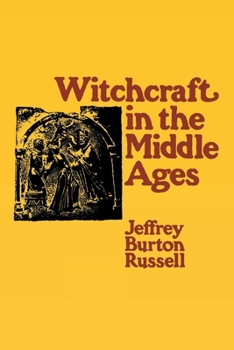Witchcraft in the Middle Ages: Narrative as a Socially Symbolic ACT
Select Format
Select Condition 
Book Overview
All the known theories and incidents of witchcraft in Western Europe from the fifth to the fifteenth century are brilliantly set forth in this engaging and comprehensive history. Building on a foundation of newly discovered primary sources and recent secondary interpretations, Jeffrey Burton Russell first establishes the facts and then explains the phenomenon of witchcraft in terms of its social and religious environment, particularly in relation...
Format:Paperback
Language:English
ISBN:0801492890
ISBN13:9780801492891
Release Date:August 1984
Publisher:Cornell University Press
Length:394 Pages
Weight:1.24 lbs.
Dimensions:1.1" x 6.0" x 8.8"
Age Range:18 years and up
Grade Range:Postsecondary and higher
Customer Reviews
2 ratings
Not a book on Modern Witchcraft
Published by Thriftbooks.com User , 20 years ago
This is a very well written scholastic book about the sociopolitical events and ideas that led to the formation of the modern concept of Witchcraft. This is not a book on the Witch Trials of the 17 or 18th century. Nor is it ment to be all inclusive of every witch trial that ever took place. The writer does a credible job of leading the reader to understand the medieval mindset of how witchcraft, sorcery and religion filled the lives of a rapidly changing environment moving from fuedalism to the reniassance. There are always bleeding of the writer's personal beliefs and thoughts as it was when the book was written. This book is no different as some of the attitudes posed by the writer is common for the period that he wrote the book in (the 70's). This should not deter the reader from enjoying this book for the intelligent and excellent read that it is. Definately a book to add to your collection.
Outstanding interpretation of events....
Published by Thriftbooks.com User , 23 years ago
WITCHCRAFT IN THE MIDDLE AGES by Jeffrey Russell is a salient and well-written history about religious persecution during the Middle Ages involving individuals accused of the practice of "witchcraft". WITCHCRAFT was first published in the early 1970s when a renewed interest in the craft was gaining public attention. Adherents of the craft have suffered a severe and enduring persecution--worse than any other religious persecution--including that of the Jews. Even today, in an era when folks pat themselves on the back for their religious "tolerence" and/or secular outlook, "witchcraft" is still largely misunderstood. Even the name is a misnomer.Russell, who seems mostly objective, refers to the modern practice of "witchcraft" as "puerile" indicating he does not really understand the practice per se. Russell is not a participant-observer, he is an outsider examining in as objective a manner as possible events that transpired over a period of thousand years. He does not examine and order these events from the perspective of the practicioner being persecuted, he arranges them from the standpoint of the authories who now wonder what happened. Russell says currently there are four views extant in the West concerning "witchcraft" -- mainstream Roman Catholics, Protestants and Jewish groups pretty much ignore it; Fundamentalist Judeo-Christian groups see it as a "clear and present danger" and "the work of the devil"; Liberals see it as silly or sick behaviour ignorant church people persecute and mentally deranged and confused souls practice; Ethnographers describe "witchcraft" as worldwide and real, with devoted adherents. In the Middle Ages, the practice of "witchcraft" was associated with the diverse behaviors of various individuals or groups who for one reason or another found themselves on the wrong side of church law--first Roman Catholic and then Protestant Reformed. Russell says amazingly, individuals who participated in the Renaissance and Reformation, who overturned, destroyed, and abandoned many of the practices of the Church of Rome, retained the Catholic position on "witchcraft" and persecuted people suspected of the practice with a vengence unequaled by their predecessors. Russell examines the roots of the Chistian attitude toward witchcraft. He says that during the Babylonian captivity, when the Jews were cruelly carried off and enslaved, they came to accept the reality of evil. Through their efforts to understand and deal with evil, they accepted it must have a creator, i.e. a source. But how can a good God be the source of evil? Enter the devil. Russell says the dual thinking of the Jews (God and Satan--he provides many Biblical references to Satan--including the book of JOB), combined with the Greco-Roman belief in daemons (angelic entities who communicated with the gods) influenced thinking in the newly evolved Christian world. As the Church fathers grappled with folk beliefs that included Roman lares/penates and Celtic/Germanic Va






